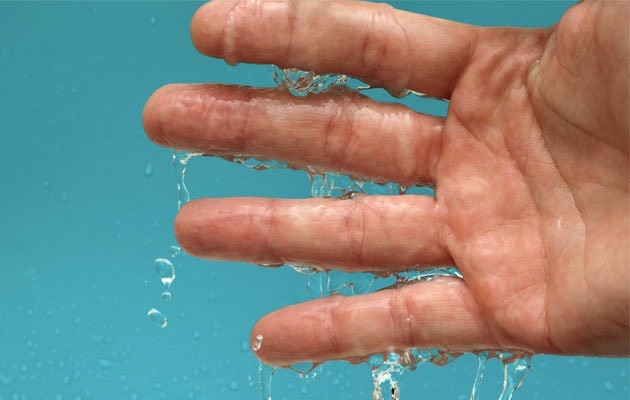Recognizing the Source of Excessive Sweating and Its Influence on Daily Life
While it is generally understood as a physical feedback to manage body temperature, the triggers for excessive sweating can vary extensively amongst people, including not only physical variables yet emotional and likewise emotional components. By delving into the origin triggers of hyperhidrosis and exploring its complex impacts, a deeper understanding of this prevalent problem can be gained, losing light on the complexities that people grappling with extreme sweating navigate on a day-to-day basis.
Physiology of Sweat Glands
The law of sweat production, a critical physiological procedure, is largely managed by the task of sweat glands dispersed across the human body. Sweat glands are classified right into two primary kinds: eccrine and apocrine glands.
When the body temperature increases, either as a result of physical activity, heats, or psychological stress, the nerves activates the gland to produce sweat. This sweat is composed largely of water and electrolytes like salt and chloride. The process of sweat production is necessary for maintaining the body's internal temperature within a slim, optimum array, highlighting the crucial function gland play in human physiology.
Triggers for Excessive Sweating
In understanding the origin of extreme sweating, it is critical to identify the triggers that can lead to this physiological reaction. Extreme sweating, likewise called hyperhidrosis, can be motivated by numerous variables, both environmental and physiological. One common trigger is psychological stress or anxiety, which can stimulate the body's sweat glands to produce more sweat than is necessary for cooling down. Physical physical effort, high temperature levels, and spicy foods are additionally recognized to cause too much sweating in people susceptible to this problem. Specific clinical conditions like hyperthyroidism, diabetes, or menopause can contribute to excessive sweating as well.
In addition, medicines such as some antidepressants, opioids, and certain supplements can additionally serve as triggers for hyperhidrosis. Recognizing these triggers is necessary in handling too much sweating successfully - Sweaty hands treatment. By recognizing and attending to the specific triggers that motivate excessive sweating in a specific, doctor can establish tailored treatment strategies to alleviate this problem and boost the individual's top quality of life
Medical Conditions Associated
Connected with too much sweating are various medical problems that can exacerbate this physiological feedback. One common condition is hyperhidrosis, a problem characterized by unusually boosted sweating that exceeds the body's thermoregulatory needs. This can materialize in focal locations like the palms, soles, underarms, or face, impacting an individual's lifestyle as a result of social embarrassment and discomfort.
Furthermore, endocrine disorders such as hyperthyroidism, diabetic issues, and menopausal hot flashes can likewise cause too much sweating. Hyperthyroidism creates an overflow of thyroid hormonal agents, increasing metabolic rate and causing sweating. Diabetes mellitus can generate sweating episodes, specifically throughout hypoglycemic episodes when blood glucose levels drop too low. Menopausal warm flashes, credited to hormone changes during menopause, can trigger sudden and intense sweating, commonly gone along with by flushing and heart palpitations.
Moreover, infections like endocarditis, tuberculosis, and hiv have actually from this source been connected with night sweats, an usual sign known to interfere with rest and affect total wellness. These clinical problems highlight the diverse series of underlying elements that can contribute to extreme sweating, necessitating thorough analysis and administration by medical care experts.
Emotional and Mental Aspects

Influence On Social Interactions
Too much sweating can have profound effects on a person's ability to involve comfortably in social interactions. The noticeable signs of sweat spots or damp patches on garments can lead to humiliation and self-consciousness, creating individuals to withdraw from social scenarios. This withdrawal can impact connections, restriction social activities, and impede expert and individual development.

Furthermore, the stress and anxiety and self-worth concerns originating from excessive sweating can affect communication and interpersonal skills. People might battle to concentrate on discussions, get involved in team tasks, or express themselves confidently. This can lead to feelings of isolation and loneliness, as social connections become challenging to maintain.
Conclusion

While it is frequently comprehended as a physiological reaction to regulate body temperature level, the triggers for too much sweating can vary widely among people, including not only physical factors yet additionally psychological and psychological elements. By diving into the root creates of hyperhidrosis and discovering its multifaceted results, a much deeper understanding of this pervasive concern can be gotten, shedding light on the intricacies that people grappling with excessive sweating browse on an everyday basis.
Physical exertion, high temperature levels, and spicy foods are likewise recognized to activate excessive sweating in people susceptible to this problem. By determining and addressing the details triggers that trigger excessive sweating in a private, healthcare carriers can establish personalized therapy plans to ease this condition and enhance the person's high quality of life.
Too much sweating can have profound results on an individual's capability to involve conveniently in social communications.